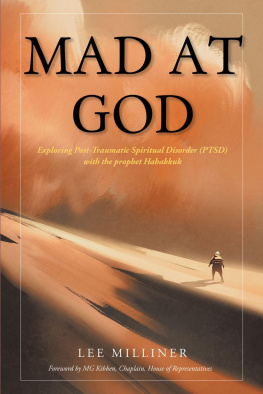Chapter 1
The Perplexity of the Prophet
Questions and Answers
F inding the Old Testament prophetic book of Habakkuk may require the use of the Bibles index. Tucked among the twelve minor prophets, Habakkuk has often been overlooked as readers and students desire to get to the larger and more well-known major prophets. The size of the prophetic writing and the status of the prophet, however, do not determine the importance of the prophets message. Consisting of only three chapters, Habakkuks value is far greater than its small size.
The seventh-century BC prophet Habakkuk lived and ministered during a time of turmoil in the small nation of Judah. Israel to the north had been subjected to the military advances of Tiglath-pileser III and his great Assyrian army. Israel and its capital Samaria fell to the Assyrians in 721 BC, and the people of Israel were scattered within the Assyrian empire. Judah had survived the Assyrian conquests but was required to pay a heavy tax to Assyria which took an economic toll on the kingdom and its people.
The Chaldeans mentioned in 1:6 challenged the Assyrians, and ultimately its great capital Nineveh fell in 612 BC. Judah soon became a vassal state of these conquerors but survived until 587 BC when Judah and its capital Jerusalem fell to the invading armies of the Babylonians (Chaldeans). Though opinions vary and the book provides only a few hints as to date, it can be argued that the prophet Habakkuk ministered in the period after the fall of Nineveh, the capital of Assyria (612 BC) and before the destruction of Jerusalem and the fall of the kingdom of Judah (587 BC). Baily and Barker in their The New American Commentary: Micah, Nahum, Habakkuk, Zephaniah conclude, It was an agitated time, characterized by rapid political change, international turmoil, bloody military encounters, and a growing rebellion against the demands of the covenant by the great majority in Judah (p. 251).
The prophet witnessed the moral and spiritual degeneracy in Judah and the demise of law and order. He saw the increase in violence, the weakening of judicial authority and the inattention to the moral and legal code of their religion. Habakkuk intuitively knew that Judah was a dying nation and he could not understand why God didnt intervene to change the course of destruction.
Chapter 1 of Habakkuk clearly communicates the perplexity of the prophet in the content of the prophets prayer. The prophet presents his protest to God in sincere and reverent prayer. He could not understand why the circumstances in Judah were being allowed to deteriorate. Each day he witnessed the turmoil in his country; the burden for his beloved land and its people grew greater. He prayed passionately to God.
God Hears Our Prayers
Before consideration is given to the content of the prophets prayer, we need to understand a basic premise behind the prayer of this prophet. It is so basic that it is often sadly ignored or simply assumed. The prophet believed that God hears prayers and that God heard his prayerful petitions. Here is the altar on which every prayer must be offered. The style of prayer, the position of prayer, the language of prayer, even the substance of prayernone of these things seriously mattered to this prophet in pain. Of paramount importance is a simple (even childlike) belief that God hears his prayers. Though Habakkuk could not understand why things were happening the way they were and why God would allow these things to occur, he never wavered in his bold belief that his God heard him whenever he prayed. If not, why pray? If one didnt believe that God heard prayers, then prayer would in fact be an exercise in futility. Therefore, though an elementary element, this belief is foundational to our faith and pivotal for the practice of prayer.
God hears us when we pray. It doesnt matter if we are in church, by our beds at night, or in our cars driving to and from work. It doesnt matter if we whisper our prayers, shout out our prayers, or pray silently in our mind and heartGod hears our prayers. Even though there are millions of us praying at the same time and from all continents of the world, God hears our individual prayers. I cant explain it or fathom it, but I believe it. So did the prophet Habakkuk. That is why he prayed. That is why we pray. It is what gives importance to the act of prayer, and it is the impetus for prayer. The belief that we can speak to the Supreme Being from our soul, believing that our words are heard and that their meaning will never be lost in translation, is fundamental to understanding prayer. To Habakkuk and all who pray, this is the mystery and miracle of prayer. God hears the words and God hears all that is behind those words. The prophet Jeremiah proclaimed, For surely I know the plans I have for you, says the Lord, plans for your welfare and not for harm, to give a future with hope. Then when you call upon me and pray to me, I will hear you. When you search for me, you will find me; if you seek me with all of your heart (29:1113).
There are those times when we have to repeat this profound belief to ourselves to reinforce its meaning, God hears my prayers! Yes, God hears my prayers. Feelings may indicate otherwise. We may sense that God is absent from us and the eerie silence is too much for us to endure. We look for indications in every direction that our prayer is being heard, but there are no assurances. We seriously speculate that perhaps our prayers are a waste, so why pray? These are indeed painful times when we must state emphatically, God hears my prayers. The power of these words cited over and over again can clear our soul of doubts fog and unleash our spirit to sense Gods presence.
I have counseled with numerous people who questioned whether God was hearing their prayers. They needed reassurance from a minister. Their emotions of anger, disappointment, grief, and depression were blocking any feelings of goodness, love, kindness, and grace. Therefore, they incorrectly assumed that God was far removed from their pain, oblivious to their predicament, and deaf to their petitions. Their emotional pain simply interfered with their sensing the presence of God. Unable to sense intuitively Gods presence, they thought that God had rejected them and refused to hear their prayers. The darkness of Gods apparent neglect and His silence blackened their skies and they saw negative everywhere. The reassurance they sought from a minister was that God was indeed hearing their prayers in spite of missing evidence. The chaplain can communicate care and compassion. Rodgers observes, God calls us to walk with the wounded as living reminders of Gods love; offering guidance, support, and hope for the spiritual journey to full recovery. This is soul workheart workand demands the best of us (p. 106).
I have asked people to do a simple recitation for several minutes before they pray, God hears my prayers. I have suggested that they visualize God sitting on a celestial throne listening to them. Most have reported back to me that it made a tremendous difference in their prayers. Reciting God hears my prayers and visualizing God leaning over and listening to them made it much easier to perceive that God was hearing them and being attentive to their concerns.
I was asked to supervise a new chaplain on his first tour of duty. He had deployed with his unit for six months. Several months into the deployment, it became apparent to the senior chaplain that his wife was becoming involved with another man. Thus, he was brought home immediately and informed of his wifes behavior. All concerned hoped that they could work through their issues.
Upon his arrival home, he was shocked to discover that his wife had allowed a Marine to move into their house. She did not deny what she had done and stated that the affair would continue. He was devastated. He had been engaged in Christian ministry to the men and women of the Marine Corps, sacrificing for God and country, and this happened. The senior chaplain assigned him to me and asked that I serve as his supervisory chaplain and provide pastoral care to him.











